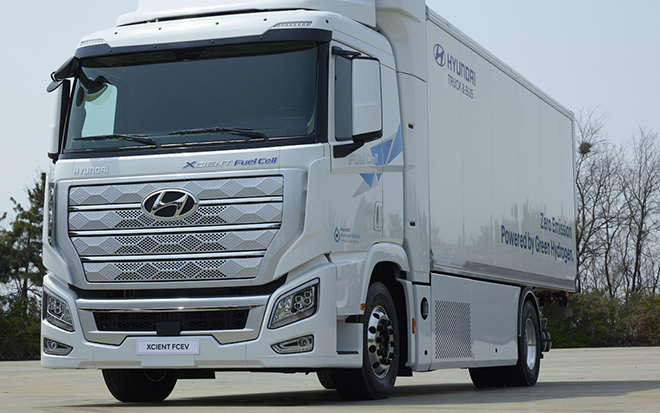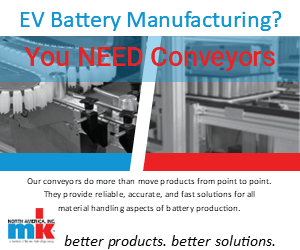Even as automakers have been abandoning hydrogen fuel cells as a powertrain option for passenger cars, many believe that the technology will find its niche in the heavy-duty truck sector. Now Hyundai is moving beyond the pilot stage and beginning to deliver vehicles to customers.
The company has shipped 10 units of the XCIENT Fuel Cell, which it says is the world’s first mass-produced fuel cell heavy-duty truck, to Switzerland—the first of 50 it plans to deliver this year. The h-trucks will be handed over to commercial fleet customers starting in September. Hyundai hopes to roll out as many as 1,600 XCIENT Fuel Cell trucks by 2025.
“XCIENT Fuel Cell is a present-day reality, not a mere future drawing board project,” said Executive VP In Cheol Lee. “Building a comprehensive hydrogen ecosystem, where critical transportation needs are met by vehicles like XCIENT Fuel Cell, will lead to a paradigm shift that removes automobile emissions from the environmental equation.”
XCIENT is powered by a 190 kW hydrogen fuel cell system with dual 95 kW fuel cell stacks. Seven hydrogen tanks offer a combined storage capacity of around 32 kg of hydrogen. Driving range is about 400 km, and refueling time is from 8-20 minutes.
Hyundai chose Switzerland to launch its hydrogen venture for at least two reasons. First, the Swiss impose a heavy road tax on commercial vehicles, but it doesn’t apply to zero-emission trucks. The tax savings bring the cost per kilometer of a fuel cell truck almost to parity with a legacy diesel truck. Second, Hyundai’s business case envisions using clean hydrogen generated from hydropower, and Switzerland has one of the highest shares of hydropower in the world.
A joint venture with Swiss company H2 Energy will lease the trucks to fleet operators on a pay-per-use basis, with no up-front investment required. The first users will be members of the Swiss H2 Mobility Association, a group of around 20 firms, including grocery chains Migros and Coop, dairy producer Emmi, and filling station operators SOCAR and Tamoil. The pay-per-use contracts include mileage, warranty, services, insurance and access to hydrogen.
Once the project is underway in Switzerland, Hyundai plans to expand it to other European countries.
Supermarket chain Migros is taking three XCIENTs, and plans to measure their performance against a Mercedes-Benz battery-electric truck, three biogas-fueled trucks from Iveco, and legacy diesels.
Rainer Deutschmann, Director of Corporate Transportation Logistics at Migros, which operates 900 trucks shuttling between 22 production sites and nearly 900 shops, told Reuters he expected several technologies to play a role in decarbonization. “We will see on each journey what the energy consumption will be depending on the geography and topology,” he said. “With an electric battery, instead of carrying merchandise around you are carrying around the battery. You have a 200 km range, which you can use for a city, but you cannot use it for the Alps. H2 you can use for everything.”
Source: Reuters, CleanTechnica




















































